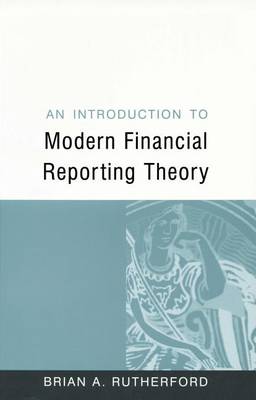Accounting and Finance
2 total works
An Introduction to Modern Financial Reporting Theory
by Brian A Rutherford
An Introduction to Modern Financial Reporting Theory explains the content of the Statement in an accessible language, specifically for the student of accounting and finance. This text will be of direct and practical interest to students who need to understand the contents of the new framework, which helps to explain: why and how financial reporting is carried out; why financial statements are prepared in the way that they are; why accounting standards specify one method rather than another; how the methods specified by accounting standards relate to each other; how practice has developed and will continue to develop.
Brian Rutherford emphasizes and enlarges on the key features of the framework, provides many more examples, shows how the framework applies in practice and also offers some criticisms of its content. The book clarifies to students why various methods and practices in accounting have evolved, while illustrating how they relate to each other and to the underlying function of financial reporting.
This text will be essential reading on university and professional courses in advanced financial accounting, particularly courses on Accounting Theory and Financial Reporting.
Brian Rutherford is Professor of Accounting at Canterbury Business School, University Kent at Canterbury.
Cases in Company Financial Reporting
by Robert E Jupe, Stuart Manson, Brian A Rutherford, and Robert T Wearing
This book provides case material which can be used to investigate the pragmatic and political, as well as the technical, dimensions to financial reporting. The authors present a variety of real-life British case studies in financial reporting, for use in teaching financial accounting techniques, accounting policy and interpretation of financial statements.
The case studies illustrate a wide variety of important issues in contemporary financial reporting. Most cover a specific problem area, such as goodwill or accounting for brands, but they also provide an opportunity to investigate the strengths and weaknesses of the accounting process itself. All the cases use real and identified companies and real accounts.
In addition, the introductory chapter shows how to set about developing an answer to case-study questions. The authors suggest a variety of questions for each case, and teachers are encouraged to develop alternative questions appropriate to their individual courses.
The solutions notes for each case are available in a disk for instructors who recommend the book for course use.

